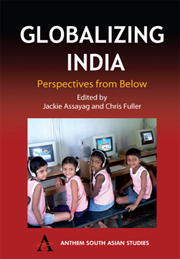Book contents
- Frontmatter
- Contents
- List of Contributors
- Acknowledgements
- 1 Introduction
- Part One Economy and Agriculture
- 2 On the History of Globalization and India: Concepts, Measures and Debates
- 3 In Search of ‘Basmatisthan’: Agro-nationalism and Globalization
- 4 Seeds of Wrath: Agriculture, Biotechnology and Globalization
- 5 Weaving for IKEA in South India: Subcontracting, Labour Markets and Gender Relations in a Global Value Chain
- Part Two Education and Language
- Part Three Culture and Religion
- Bibliography
5 - Weaving for IKEA in South India: Subcontracting, Labour Markets and Gender Relations in a Global Value Chain
from Part One - Economy and Agriculture
Published online by Cambridge University Press: 05 March 2012
- Frontmatter
- Contents
- List of Contributors
- Acknowledgements
- 1 Introduction
- Part One Economy and Agriculture
- 2 On the History of Globalization and India: Concepts, Measures and Debates
- 3 In Search of ‘Basmatisthan’: Agro-nationalism and Globalization
- 4 Seeds of Wrath: Agriculture, Biotechnology and Globalization
- 5 Weaving for IKEA in South India: Subcontracting, Labour Markets and Gender Relations in a Global Value Chain
- Part Two Education and Language
- Part Three Culture and Religion
- Bibliography
Summary
This chapter focuses on the processes by which a rural labour force in Tamil Nadu, South India, is recruited to produce for a global company. The intensification of global sourcing by networked enterprises has led to the mobilization of rural workers across the world to produce for the export market. However, little is known about the manner in which such enterprises subcontract work or about the ways in which rural labourers come to produce for a global commodity chain (Cox 1997: 11). This chapter aims to explore two sides of this issue.
Firstly, it examines the process by which the production of rag rugs for IKEA is subcontracted to weavers in a rural area of Tamil Nadu. It explores the ways in which caste, gender and kinship are central to the generation of a network of rural weavers at the tail end of a commodity chain.
Secondly, it focuses on the rural workers themselves: the opportunities that are available to them, and their decisions to weave or not to weave. It is suggested that the choices made by rural workers have to be understood in the context of local constraints imposed by highly fragmented labour markets and prevailing sexual divisions of labour. It is argued that in the area under consideration the rural labour markets are firmly segmented due to particular caste occupations, perceptions of work, gendered ideologies of skill, and sexual divisions of labour.
- Type
- Chapter
- Information
- Globalizing IndiaPerspectives from Below, pp. 89 - 116Publisher: Anthem PressPrint publication year: 2005
- 7
- Cited by



